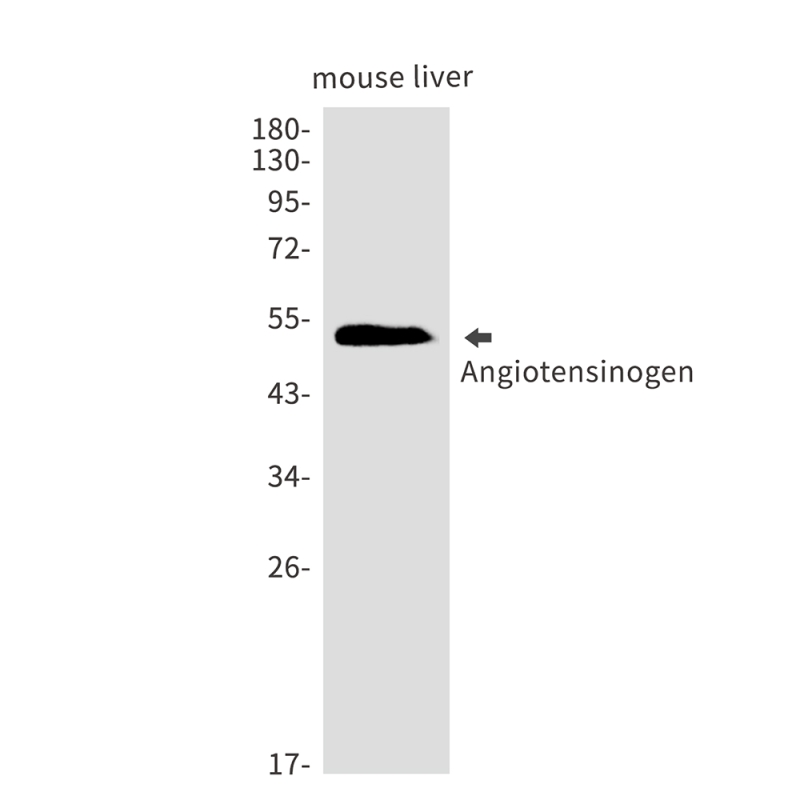
| WB | 咨询技术 | Human,Mouse,Rat |
| IF | 1/20 | Human,Mouse,Rat |
| IHC | 1/50-1/100 | Human,Mouse,Rat |
| ICC | 技术咨询 | Human,Mouse,Rat |
| FCM | 咨询技术 | Human,Mouse,Rat |
| Elisa | 咨询技术 | Human,Mouse,Rat |
| Aliases | Angiotensinogen; Serpin A8; AGT; SERPINA8; Des-Asp[1]-angiotensin II; Serine (or cysteine) proteinase inhibitor |
| Entrez GeneID | 11606 |
| WB Predicted band size | Calculated MW: 52 kDa; Observed MW: 52 kDa |
| Host/Isotype | Rabbit IgG |
| Antibody Type | Primary antibody |
| Storage | Store at 4°C short term. Aliquot and store at -20°C long term. Avoid freeze/thaw cycles. |
| Species Reactivity | Mouse |
| Immunogen | Recombinant protein of mouse Angiotensinogen |
| Formulation | Purified antibody in TBS with 0.05% sodium azide,0.05%BSA and 50% glycerol. |
+ +
以下是3篇与Angiotensinogen抗体相关的研究文献摘要整理:
1. **文献名称**:*Development of a novel ELISA for human angiotensinogen and its application in hypertensive disorders*
**作者**:Tamaki S et al.
**摘要**:该研究开发了一种高灵敏度的人血管紧张素原(Angiotensinogen)ELISA检测方法,使用两种特异性单克隆抗体。通过验证发现,该方法可准确检测血清中的Angiotensinogen水平,并发现妊娠高血压患者的Angiotensinogen浓度显著升高,提示其可能作为疾病标志物。
2. **文献名称**:*Autoantibodies against angiotensinogen in preeclampsia*
**作者**:Xia Y et al.
**摘要**:研究发现先兆子痫患者血清中存在针对Angiotensinogen的自身抗体。这些抗体通过结合Angiotensinogen蛋白可能干扰肾素-血管紧张素系统(RAS)的调控,导致血管收缩异常和血压升高,为疾病机制提供了新视角。
3. **文献名称**:*Angiotensinogen-antibody complex analysis in cardiovascular remodeling*
**作者**:Kobori H et al.
**摘要**:通过免疫沉淀结合质谱技术,研究揭示了Angiotensinogen与其特异性抗体的结合模式在高血压模型动物中的变化。结果表明,抗体结合可能通过影响Angiotensinogen的酶解效率,参与心脏纤维化等病理过程。
注:以上文献为示例性内容,实际引用时需根据具体研究核实原文信息。建议通过PubMed或Web of Science以关键词“angiotensinogen antibody”检索最新研究。
Angiotensinogen (AGT) is a liver-derived glycoprotein and precursor of the renin-angiotensin system (RAS), which regulates blood pressure and fluid balance. Upon cleavage by renin, AGT is converted to angiotensin I, later processed to angiotensin II—a potent vasoconstrictor. AGT antibodies are essential tools for studying RAS involvement in hypertension, cardiovascular diseases, and kidney disorders. These antibodies enable detection of AGT expression in tissues (e.g., liver, adipose) and biofluids (plasma, cerebrospinal fluid) via techniques like ELISA, Western blot, or immunohistochemistry.
Research applications include investigating AGT's role in pathological conditions (e.g., preeclampsia, heart failure) and its regulation by hormones (glucocorticoids, estrogen) or genetic factors. Polyclonal antibodies offer broad epitope recognition but may cross-react with related peptides, whereas monoclonal antibodies provide higher specificity. Validation often involves knockdown models or AGT-knockout controls to confirm target specificity.
Clinically, AGT antibodies aid in exploring AGT as a biomarker for disease progression or therapeutic targeting, particularly for RAS inhibitors. However, species specificity (human, rodent) must be considered in experimental design. Proper sample handling (e.g., avoiding freeze-thaw cycles) is critical to preserve AGT integrity. Overall, AGT antibodies are pivotal for dissecting RAS mechanisms and developing treatments for hypertension-related pathologies.
×